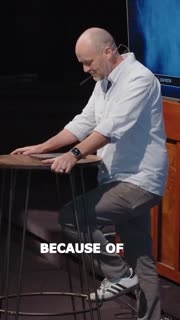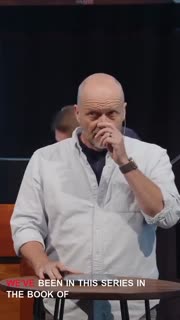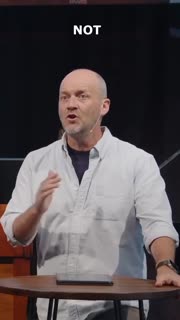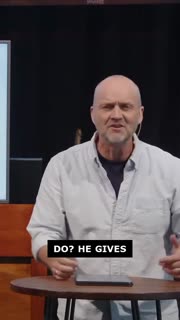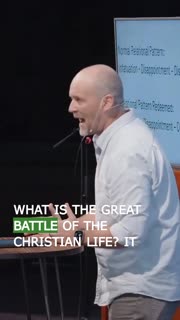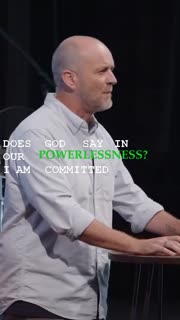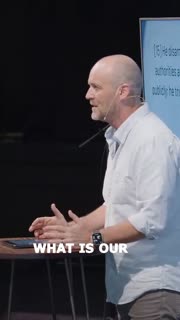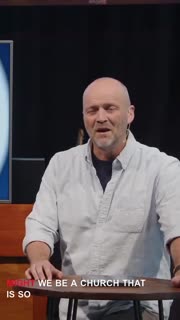Hope and Healing Through God's Promises
Devotional
Sermon Summary
Bible Study Guide
Sermon Clips
1. "Because of Jesus, who is the victim of injustice so that we can be received, be the recipients of grace. The gospel we believe allows us, Lord, to acknowledge that each of us is guilty of self-protection and that that has affected others. The gospel allows us to accept that many of us have received privileges from a society that has also oppressed others. The gospel allows us to hear truth without needing to defend ourselves from it. So we ask, Lord, that you would continue to give us the faith to listen to hard things and choose to lament instead, instead of debate." [30:07] (32 seconds)
2. "We've been in this series in the book of Exodus where we have been considering the pattern of God's redemption to liberate and oppress people whose slavery was generations in the making. And it's a powerful reminder that history is cyclical that the problems that exist in the world are sinful and that because of sin people are natural enemies. We've explored this and considered this story that happened in history we do so with the gospel informing it. See the gospel allows us to acknowledge that people are sinners and that that affects society that we can acknowledge that sin is the problem in the world while also not feeling powerful in the midst of it all. The gospel allows us to do that." [32:41] (52 seconds)
3. "I think to not engage the past is to limit the power of God in our midst to live in denial to live detached is to say to God you just be God and I'm going to live my life God doesn't work like that remember Moses remember Moses a big part of this Exodus story about him about a month ago had a good normal life after he had murdered somebody and had to flee his family he created and carved out a life where he had a a job where he had a family where he had property he had a place until God came and interrupted his normal but it's important for us to see that his normal was shaped by things that were not normal that he was living in denial that when he ran away from Egypt he was running away from his true self that he was living divided that he was isolated from his home and his community that he was living defensive he was resistant to change and he chose to be more self-reliant and protect himself and guard that normal God doesn't let him use him to declare his work to the people who are still oppressed." [36:11] (93 seconds)
4. "What does God do? He gives more promises. In Exodus 6, we hear him repeat these things. I am the Lord. I've established my covenant. I've remembered my covenant. I'm the Lord. I will bring you out. I will deliver you from slavery. I will redeem you. I will take you home. I will take you to be my people. I will be your God. I am the Lord. He doesn't do anything. He doesn't like, okay, yeah, no, I probably should do something about this. What does he do? He says, listen, you need to believe. Your hope has to be based on the promise before the power. You have to believe it because it is essential to understand my true nature, God is saying. When God says, I make a covenant to you, he is basically making a covenant with himself that his words will never be reneged upon. God cannot renege on a covenant because it wouldn't be true to who he is. And so he commits to them again. He says, I am with you. I've established this covenant. I've made this promise. I will do all of these things. You need to believe." [49:51] (66 seconds)
5. "What is the great battle of the Christian life? It is not doing the right things. It is believing the truth. The truth about what? The truth about the gospel, which is God's covenant in action. That's the evidence of our hope. The words of truth that Jesus came to earth, lived a sinless life, died on the cross to pay the penalty for my sin. And I know that's the evidence of our hope. And I know that's the evidence and rose victorious to show us, to show me, to show you that he has the power over sin. At the cross, he took away the penalty. At the resurrection, he shows us that he takes away the power so that we can live in what? Hope. How? By faith. Hope only comes by faith. Hope is not objective. It is built around this idea that I've got to trust that God loves me, especially when I don't feel it. Especially when things get harder. Especially when I am confronted by those lies. Our faith and our hope is built around what God has already done on our behalf." [56:16] (70 seconds)
6. "What does God say in our powerlessness? I am committed to you. The cross is the picture of it. I want you to go to Colossians, and we'll kind of wrap up here, not too quickly, but this is really beautiful stuff. Paul says this, Colossians 2.9, for the entire fullness of God's nature dwells bodily in Christ. And you have been filled by him who is the head over every ruler and authority. You were also circumcised in him with a circumcision not done with hands by putting off the body of flesh in the circumcision of Christ. When you were buried with him in baptism, in which you were also raised with him through the faith and the working of God, who raised him from the dead. And when you were dead in trespasses and in the uncircumcision of your flesh, he made you alive with him and forgave us all our trespasses. He erased the certificate of debt with its obligations that was against us and opposed to us and has taken it away by nailing it to the cross. He disarmed the rulers and authorities and disgraced them publicly. He triumphed over them." [59:20] (62 seconds)
7. "What is our trust that God cannot break a promise? It's in the nature of who God is, not in who we are. So when I look and I say, something must be wrong with me, that's why God is not blessing me. That is why God is not working for me. That is why God is not working for me. That is why God is not working for me. We are believing a lie from the pit of hell that God has said, all of this is for you now. Everything belongs to you now. What does these verses say? You're no longer powerless. You've been filled with him who is the head over every ruler and authority. What? What? Yes, you have authority over every other power in Christ. You can speak truth to power. You can speak truth to the demonic. You can speak truth to society. You can speak truth to the devil. You can speak truth to society's, you know, deception. You can speak truth to those in your life who want to control you or oppress you. You can speak that truth, knowing, knowing that it cannot control you. That we're no longer without a promise. God is committed to us. And he's committed to us in Christ. That we're no longer dying. That the things we think that feel like they're killing us can't because we're alive to God. That we're no longer guilty, forgiven, and set free." [01:00:43] (77 seconds)
8. "Might we be a church that is so profoundly moved by the grace of God as demonstrated in his gospel that we view it as a threat to the gospel through it that we need not be threatened by by society bending towards the will of the people by by governments by by breakdowns by dysfunctions may we not be a threatened people may we see that he has placed within us something profound that will never change that is a demonstration of his commitment to us that the gospel would be alive in our midst that's my prayer for us that we would see everything through the light of the gospel beginning with our own pain and our own suffering." [01:03:59] (37 seconds)
Ask a question about this sermon
2. "We've been in this series in the book of Exodus where we have been considering the pattern of God's redemption to liberate and oppress people whose slavery was generations in the making. And it's a powerful reminder that history is cyclical that the problems that exist in the world are sinful and that because of sin people are natural enemies. We've explored this and considered this story that happened in history we do so with the gospel informing it. See the gospel allows us to acknowledge that people are sinners and that that affects society that we can acknowledge that sin is the problem in the world while also not feeling powerful in the midst of it all. The gospel allows us to do that." [32:41] (52 seconds)
3. "I think to not engage the past is to limit the power of God in our midst to live in denial to live detached is to say to God you just be God and I'm going to live my life God doesn't work like that remember Moses remember Moses a big part of this Exodus story about him about a month ago had a good normal life after he had murdered somebody and had to flee his family he created and carved out a life where he had a a job where he had a family where he had property he had a place until God came and interrupted his normal but it's important for us to see that his normal was shaped by things that were not normal that he was living in denial that when he ran away from Egypt he was running away from his true self that he was living divided that he was isolated from his home and his community that he was living defensive he was resistant to change and he chose to be more self-reliant and protect himself and guard that normal God doesn't let him use him to declare his work to the people who are still oppressed." [36:11] (93 seconds)
4. "What does God do? He gives more promises. In Exodus 6, we hear him repeat these things. I am the Lord. I've established my covenant. I've remembered my covenant. I'm the Lord. I will bring you out. I will deliver you from slavery. I will redeem you. I will take you home. I will take you to be my people. I will be your God. I am the Lord. He doesn't do anything. He doesn't like, okay, yeah, no, I probably should do something about this. What does he do? He says, listen, you need to believe. Your hope has to be based on the promise before the power. You have to believe it because it is essential to understand my true nature, God is saying. When God says, I make a covenant to you, he is basically making a covenant with himself that his words will never be reneged upon. God cannot renege on a covenant because it wouldn't be true to who he is. And so he commits to them again. He says, I am with you. I've established this covenant. I've made this promise. I will do all of these things. You need to believe." [49:51] (66 seconds)
5. "What is the great battle of the Christian life? It is not doing the right things. It is believing the truth. The truth about what? The truth about the gospel, which is God's covenant in action. That's the evidence of our hope. The words of truth that Jesus came to earth, lived a sinless life, died on the cross to pay the penalty for my sin. And I know that's the evidence of our hope. And I know that's the evidence and rose victorious to show us, to show me, to show you that he has the power over sin. At the cross, he took away the penalty. At the resurrection, he shows us that he takes away the power so that we can live in what? Hope. How? By faith. Hope only comes by faith. Hope is not objective. It is built around this idea that I've got to trust that God loves me, especially when I don't feel it. Especially when things get harder. Especially when I am confronted by those lies. Our faith and our hope is built around what God has already done on our behalf." [56:16] (70 seconds)
6. "What does God say in our powerlessness? I am committed to you. The cross is the picture of it. I want you to go to Colossians, and we'll kind of wrap up here, not too quickly, but this is really beautiful stuff. Paul says this, Colossians 2.9, for the entire fullness of God's nature dwells bodily in Christ. And you have been filled by him who is the head over every ruler and authority. You were also circumcised in him with a circumcision not done with hands by putting off the body of flesh in the circumcision of Christ. When you were buried with him in baptism, in which you were also raised with him through the faith and the working of God, who raised him from the dead. And when you were dead in trespasses and in the uncircumcision of your flesh, he made you alive with him and forgave us all our trespasses. He erased the certificate of debt with its obligations that was against us and opposed to us and has taken it away by nailing it to the cross. He disarmed the rulers and authorities and disgraced them publicly. He triumphed over them." [59:20] (62 seconds)
7. "What is our trust that God cannot break a promise? It's in the nature of who God is, not in who we are. So when I look and I say, something must be wrong with me, that's why God is not blessing me. That is why God is not working for me. That is why God is not working for me. That is why God is not working for me. We are believing a lie from the pit of hell that God has said, all of this is for you now. Everything belongs to you now. What does these verses say? You're no longer powerless. You've been filled with him who is the head over every ruler and authority. What? What? Yes, you have authority over every other power in Christ. You can speak truth to power. You can speak truth to the demonic. You can speak truth to society. You can speak truth to the devil. You can speak truth to society's, you know, deception. You can speak truth to those in your life who want to control you or oppress you. You can speak that truth, knowing, knowing that it cannot control you. That we're no longer without a promise. God is committed to us. And he's committed to us in Christ. That we're no longer dying. That the things we think that feel like they're killing us can't because we're alive to God. That we're no longer guilty, forgiven, and set free." [01:00:43] (77 seconds)
8. "Might we be a church that is so profoundly moved by the grace of God as demonstrated in his gospel that we view it as a threat to the gospel through it that we need not be threatened by by society bending towards the will of the people by by governments by by breakdowns by dysfunctions may we not be a threatened people may we see that he has placed within us something profound that will never change that is a demonstration of his commitment to us that the gospel would be alive in our midst that's my prayer for us that we would see everything through the light of the gospel beginning with our own pain and our own suffering." [01:03:59] (37 seconds)
